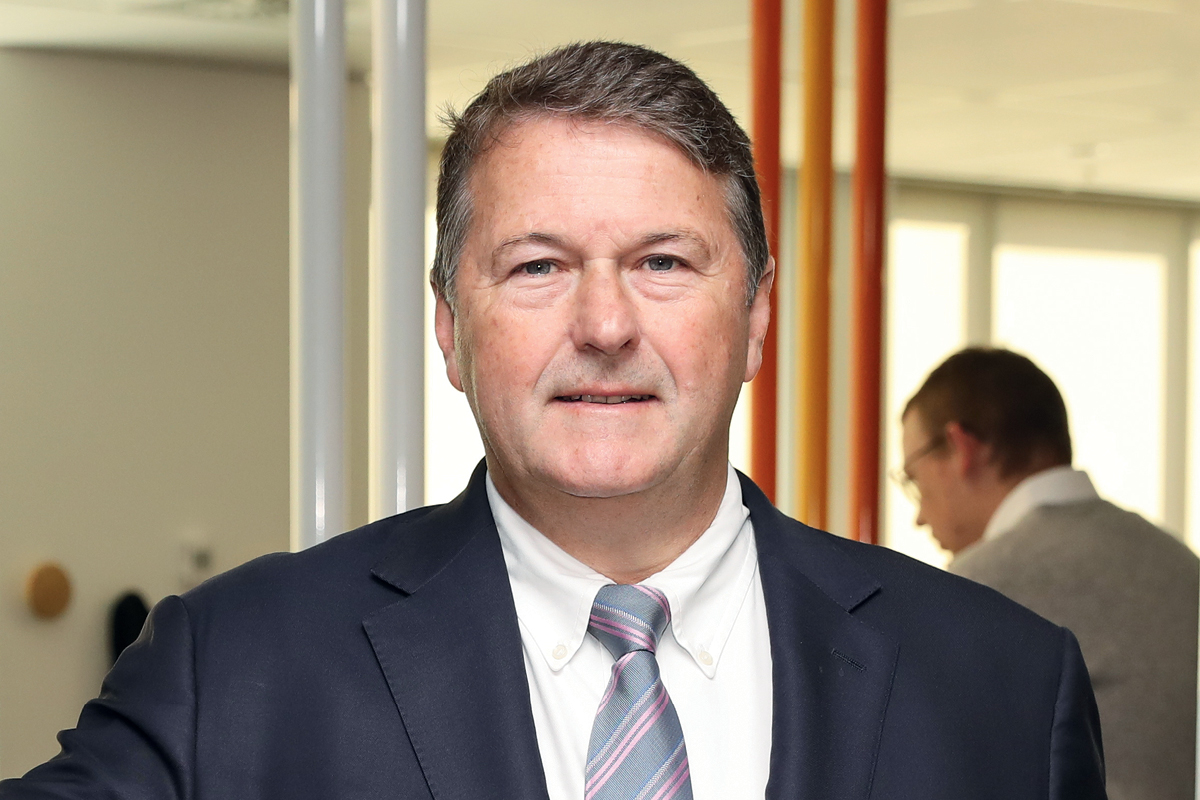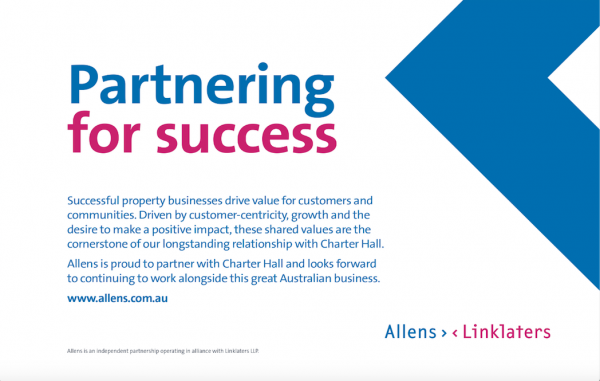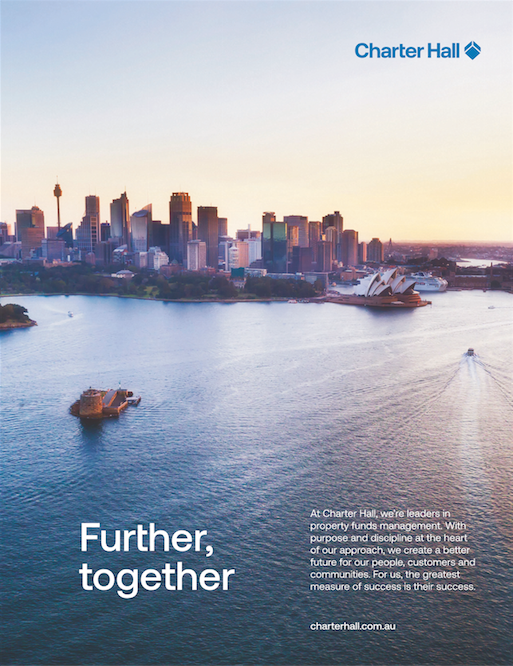A sign of a robust business model is when a company believes it can weather an unparalleled health and economic crisis and emerge as strong, if not stronger, at the other end.

Managing Director and CEO of Charter Hall Group David Harrison has unwavering confidence not only in the company’s business model, but in his team too. His certainty and belief that they will do what’s best for their customers and the business is based on the fact that the company, and largely the same team, have withstood similar cycles.
There’s something to be said for experience. Even this kind. Founded in 1991, Charter Hall is one of Australia’s leading fully integrated property groups specialising in property investment and funds management.
Focusing on four core property sectors – office, industrial and logistics, retail and social infrastructure – the company’s consistent outperformance has positioned it as a trusted manager of choice.
With A$40 billion of assets under management, the firm’s wholesale business contributes A$28 billion of that, split between pooled funds and partnerships.
Perfect partners
The unlisted wholesale property sector is split between two types of investment structures. The more common is pooled funds, which have a number of different investors with governance through an independent responsible entity or trustee board that makes all the decisions.
The second is a partnership governance structure with one, two or three investors sitting on an investment committee and making investment decisions. Adopting a partnership model has been an important differentiator for Charter Hall.
“After the 2008 global financial crisis, we saw an increased desire from large investors, both domestic and offshore, to diversify their wholesale investment,” David recalls.

“They wanted both pooled funds and partnerships. We learned quickly that the large investors, such as domestic super funds, global pension funds, insurance companies and sovereign wealth funds, wanted greater governance control over the capital they invested. We probably led the charge for partnerships in this country.”
For many partners, the pooled funds balance their portfolio and are a diversification strategy, as they’re generally lowly geared. Partnerships tend to have slightly higher gearing because the large capital partners are comfortable that they can always inject equity, if needed.
“Charter Hall provides proposals to partnership investment committees, who then respond on what to buy or sell and the gearing strategy they’re after,” he explains.
“Our partnerships in growth asset terms of A$15-16 billion are now bigger than our pooled funds of A$12 billion. This reflects the appetite of major investors. A decade ago, they would have predominantly invested in pooled funds.”
Growing together
Charter Hall has a long history of large partnership investors, including GIC Real Estate, PSP Investments, Quadreal, Victorian Funds Management Corporation, Telstra Super and AustralianSuper, who have contributed to the firm’s success in this sector.
When there’s a dislocation in a market, that’s often a good buying opportunity.
“Our growth is being driven by the increased appetite from these super funds or global pension funds or sovereign wealth funds,” David points out. “Not only do we have the expertise, but we can also source and secure assets, do pre-lease developments and curate our portfolio.”
Growing a partnership model requires an elite integrated package with the resourcing to grow and manage vast portfolios. This includes having teams in transaction, development, finance and treasury. “This is something Charter Hall has done well in,” David says.
“We have the largest transaction team in the country and we’re diversified across a whole range of sectors, which means we can offer our partners a broad range of asset classes to invest in. It’s a bit like a dating service,” David says, laughing.
“If you don’t know your client and their appetite, it’s hard to match the type of assets and portfolios that will appeal to them. We spend time working with our partners on thematics, where we think outsized returns can be generated. We’ll work with our own internal research teams and effectively create an investment strategy that’s going to be compelling for their internal investment committees.”
Weathering storms
“The COVID-19 health crisis is expected to create a slowdown in the economy and GDP growth,” David predicts. “I personally think we’re probably going to see a spike in unemployment and the economic impact will be felt for some years.
“But I do think Australia has some fundamental benefits that perhaps other countries don’t have,” he adds. “Australia has had a robust economy for 30 years because we produce product here that people want.”
David refers to Australian exports, commodities, agriculture and even service economies such as education. “I don’t see this demand slowing. There’s still long-term faith in the Australian economy and property market. But I defy anyone to look into a crystal ball to see how long and pronounced the slowdown will be. It’s going to be impacted by a whole range of factors.”
Institutional investors, David says, are still likely to invest in property. “In many of the sectors, we get long-term leases and higher fixed annual rent escalators or rent increases,” he explains.
“Getting 3% rental growth on leases is an attractive dynamic if you’re a long-term investor, compared with 1% in Europe or one to 1.5% in the United States.”
So how have Charter Hall’s partnerships fared throughout this period, and what has the company done to support and strengthen these relationships?
David, who has been with the firm since 2004, responds easily: “I’d say the relationship is as strong as it’s ever been. We may even grow our partnership business considerably. When there’s a dislocation in a market, that’s often a good buying opportunity. Large partners typically have access to capital to take advantage of lower pricing.”
The potential for a silver lining is exciting for the company. “We may see significant growth, particularly with global capital looking to invest in Australia if opportunities arise,” David states.
“It’s a good indication of Australia’s attractiveness if international capital looks at choices around the world and sees an opportunity to invest here. “During the GFC, when the world looked like it was ending, Charter Hall was one of the first groups to raise equity in our large office fund in June 2009,” David remembers.
“That showed us that institutional capital was prepared to partner with us and secure good opportunities. It’s very patient capital. Whether it’s a partnership model or a pool model, institutional investors are looking at the long term. They’re not expecting liquidity; instead, they’re looking for opportunities that are going to deliver outsized returns over a 10-year period.”
A competitive advantage of Charter Hall is its crosssector customers. “It’s a deliberate strategy to focus on these relationships,” David says. “We’re the largest owner of supermarket warehouses because we believe it’s better for both the tenant and ourselves to have a broader relationship across sectors.”
Charter Hall is the largest landlord in industrial distribution and warehouses for grocery retailers Metcash, Coles, Woolworths and Aldi, which also operate in its convenience based retail centres.
Community support
In 2017, Charter Hall was the first Australian property company to adopt the Pledge 1% philanthropic movement. The firm donates 1% of its property funds management profits to charities and a range of causes.
“Pledge 1% is a tangible way we can resonate with the community and give back to those in need,” David says.
“Because we’re in retail, childcare, industrial, office and various other social infrastructure assets, it gives a broad remit to look at the community through a lens that isn’t just about owning and developing property. We can assist in a broader social sense. We’re helping agencies give young people and those less well off the opportunity to get back on their feet, re-enter society and improve their self-worth. “We make immediate decisions,” he adds.
Fiduciary responsibility creates empathy for our customers.
“We were working with Rural Aid for drought relief and pivoted to support rural fire services during the summer bushfires. It’s not just the victims of the bushfires who have lost their homes, but also small businesses in these communities that have been devastated as well.”
People power
A customer-focused culture is ingrained in Charter Hall. In fact, 50% of all employees’ KPIs relate to customer, culture and collaboration. “It’s in our DNA to manage other people’s money,” David explains.
“We’ve been a fund manager since inception, and that fiduciary responsibility creates empathy for our customers whether they’re tenants or investors. This COVID-19 crisis has been devastating for many of our tenants, especially those who are retailers and can’t trade. We need a level of compassion to get the right result for them. We’re trying to balance the responsibility of managing the capital of 30,000 ‘mum and dad’ investors across the business as well as the small businesses the government has been trying to protect.”
David is a big supporter of rotation and believes you need to take a risk and encourage people to try different things. “We want people to get as much experience as they can at Charter Hall,” he says.
“It’s good for them and good for us. There’s nothing better than on-the-ground training and learning from someone who lives and breathes a particular discipline for a long time. You learn a lot quicker than from textbooks.
“A key element in our performance is having a very stable senior management team for a long period of time. This has enabled us to have the same people nurturing those long-term institutional investors through cycles just like this. It’s been one of the secrets of our success.”
Proudly supported by:




